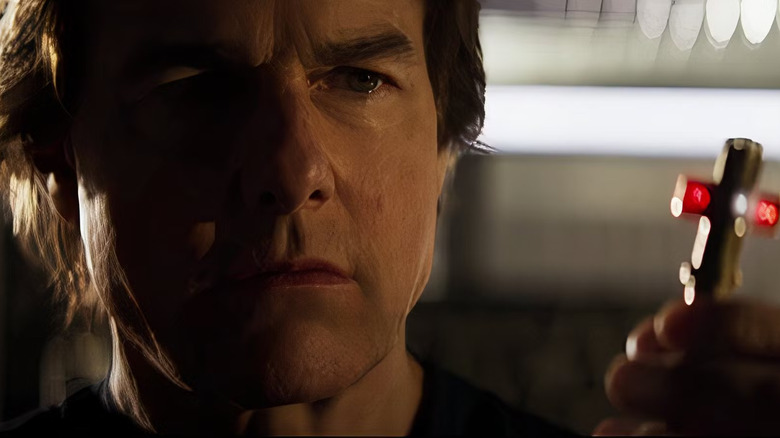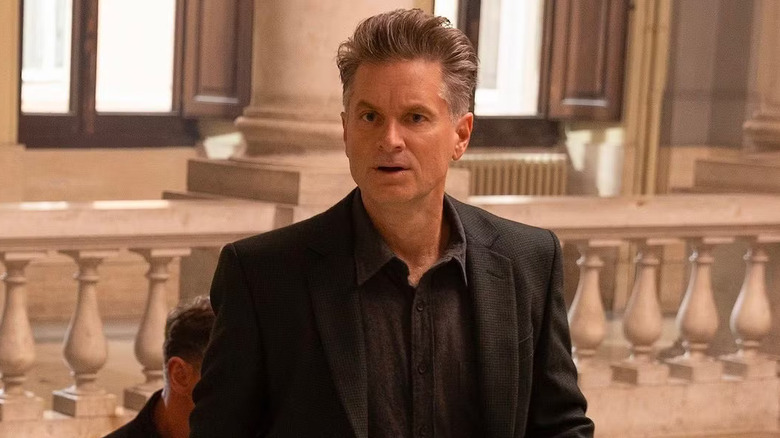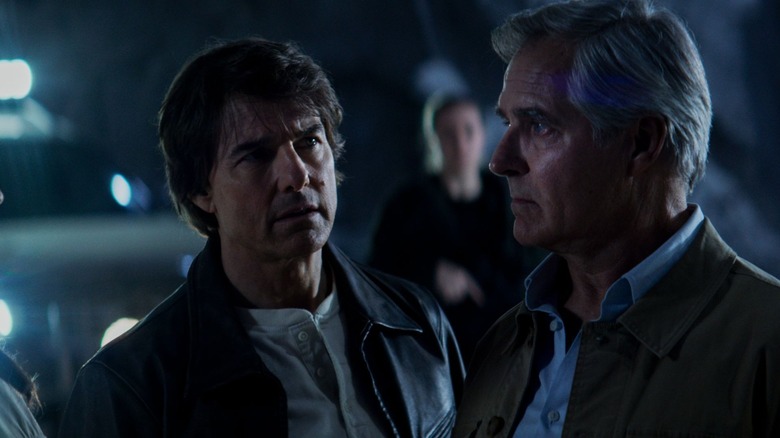The Final Reckoning Addresses A Longstanding Slight To The Original Mission: Impossible Series
This article contains spoilers for "The Final Reckoning."
Ever since the rise of Geek Culture, various pre-existing properties and series have tended to be treated with the utmost respect. While this is generally a good approach, corporations and studios have kowtowed to the fandom hordes too much and too often, to the point where major live-action adaptations are little more than copy-and-paste affairs and "superfan focus groups" are assembled to ensure that every whim of the fanbase is catered to. In our current IP-mad era, the notion of anyone actively insulting a long-running TV series with a new feature film adaptation is essentially anathema. It's almost impossible that such a venture would ever make it before cameras.
Needless to say, the '90s were a different time. Not only did a motion picture version of a long-running TV show get made where the only major retained material was the show's theme song and basic premise, but the lead character of that series was recast with another actor and turned into the insidious villain of the story. After Brian De Palma's "Mission: Impossible" was released in May of 1996, it earned $457.7 million at the box office. If that same film had been released within the last decade or so, it quite possibly might've made less money, and almost certainly would've been the epicenter of a vitriolic discourse begun by fans of the 1966-1973 series (and possibly even fans of the 1988-1990 revival).
Even to those of us who find De Palma's film a masterpiece of a spy/heist film and enjoy the naughtiness of turning Jim Phelps (Peter Graves in the series, Jon Voight in the movie) into a selfish baddie who's responsible for the death of his entire team, there's no denying that this twist toes the line between ballsy and unforgivable. After all, there's hardly another example of the wave of TV-to-film adaptations where the hero is turned into the villain, let alone in favor of a brash young actor who's decided to make the franchise his own (that would be Mr. Tom Cruise as IMF agent Ethan Hunt). Although social media wasn't a thing in 1996, there was unsurprisingly a backlash against the movie upon its release regardless, both from fans and especially from members of the original cast. Over the last 30 years, the "Mission: Impossible" films have carved their own path and legacy, with Cruise's stunt show antics now dominating the narrative. Yet neither the star nor co-writer/director Christopher McQuarrie have forgotten about the debt they owe to the original series and the character of Jim Phelps, as evident by a surprising twist in this month's "The Final Reckoning." It's a moment which may not quite make up for what the films did to the "original" Phelps, but it makes for a fascinating and moving addition all its own.
Jim Phelps, I presume?
In "Mission: Impossible — Dead Reckoning" ("Part One" if you're nasty), the character of Jasper Briggs (Shea Whigham) was introduced, and he seemed to have a chip on his shoulder regarding Ethan Hunt. Nothing too conspicuous, mind you — an offhand remark about never meeting Hunt personally here, a musing on what someone like Hunt would do with possession of the digital anti-God known as The Entity there. Yet his J. Jonah Jameson-like treatment of Hunt as a menace is curious. While McQuarrie never points any big "there's a twist coming" fingers at Briggs during "Dead Reckoning," the little clue that he laid into the character caused fans to theorize about his identity for the past couple years. To wit: Briggs is the surname of the first IMF team leader ever, Dan Briggs (Steven Hill), who was the lead of "Mission: Impossible" for its first season.
As "The Final Reckoning" reveals, Jasper Briggs isn't related to Dan Briggs, but he is related to Jim Phelps: he's his son, and he shares the same name as his father. It turns out that the chip on his shoulder is twofold: he became an intelligence agent to try and salvage his family name, and he resents Hunt for the man's part in the demise of his admittedly traitorous father. It's an intriguingly complex characterization, demonstrating that Briggs/Phelps Jr. is distrustful of Ethan both for his well-documented recklessness, but also because his own father — a stand-up agent for 30 years — ended up becoming a turncoat. It's a theme that's been a part of "Mission: Impossible" the movies ever since the very first film, the notion that Hunt is continually suspected of switching sides (even and especially if that side might be his own). From Eugene Kittridge (Henry Czerny) easily believing that it was Hunt who killed his own team to Erika Sloane (Angela Bassett) being convinced that Hunt was the terrorist John Lark in "Fallout," Ethan is often mistrusted by those who don't know him well. In a meta sense, this is what the relationship has been between fans of the TV series and the films: assuming that Cruise means to do harm to their beloved show. And, while that certainly isn't the case, the fate of the elder Jim Phelps does act as proof of such.
A new Phelps closes the circle of the Mission: Impossible series
All of this history, both on and offscreen, lends Briggs/Phelps' revelation scene with Ethan in "The Final Reckoning" a large amount of emotional weight, especially as Phelps Jr. declines to trust Ethan despite the man's pleas. It's a smart choice on the part of McQuarrie and co-writer Erik Jendresen, because it pivots the twist away from being some mere fan service moment. That's something which it would've been had Phelps Jr. already been swayed to Ethan's side after the events of "Dead Reckoning" and the beginning of "The Final Reckoning," during which Briggs/Phelps' ex-partner Degas (Greg Tarzan Davis) does indeed convert to the IMF team. A reconciliation between Ethan and Phelps Jr. should not be easy and indeed it isn't, especially because the betrayal of Ethan by Phelps Sr. is the film series' inciting incident.
Although peace between Hunt and Phelps Jr. may seem inevitable given the general tone of these films and this type of story, there's one more element which is key to Briggs/Phelps' character to help reconcile the TV series with the films. Although Briggs/Phelps is an antagonist during "Dead Reckoning," and that he's essentially teamed up with the unscrupulous Kittridge during "The Final Reckoning," at no point during his appearances is he portrayed as villainous, but merely a man attempting to maintain law and order as circumstances dictate. So while there's tension between Briggs/Phelps and Hunt, there's not animosity, either, a relationship which not only paves the way for their detente but allows Briggs/Phelps to be morally forthright, in comparison to his father.
Thus, while Ethan Hunt and (most of) his team survive the events of "The Final Reckoning," the finale of the movie proves that a conclusion to the films was never about who lives and who dies, but is instead about trust. De Palma's initial film is a bitter look at uncertain loyalties in a post-Cold War world, and every "Mission" movie since has dealt with themes of duplicitousness, obfuscation, and, with the rise of The Entity, the loss of truth itself. It's dramatically fitting and fulfilling, then, that the films come to a close with truth and trust becoming restored, and Hunt and Phelps — the movies and the TV show — finally respecting each other, with a "good guy" Jim Phelps being reinstated to the series. It may have once seemed impossible, but this mission has now been accomplished.


